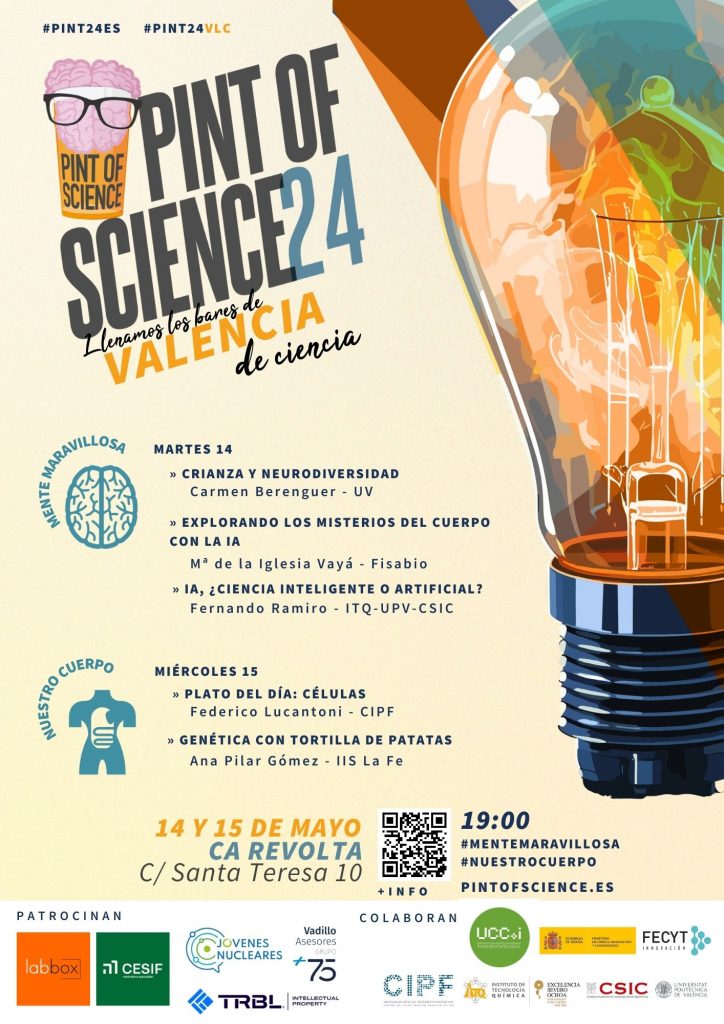Centro de Investigación Príncipe Felipe
Eduardo Primo Yúfera, 3
Events by this organizer
april
11apr12:3013:30FBR: Josep Forment and Paola Marco-Casanova
Event Details
Targeting the DNA damage response in cancer treatment Speaker: Josep Forment, PhD & Paola Marco Casanova , PhD Institution: Bioscience Department Director & Associate Director at AstraZeneca Place: Jerónimo Forteza conference room, CIPF
Event Details
Targeting the DNA damage response in cancer treatment
Speaker: Josep Forment, PhD & Paola Marco Casanova , PhD
Institution: Bioscience Department Director & Associate Director at AstraZeneca
Place: Jerónimo Forteza conference room, CIPF
Abstract: Genomic instability is one of the hallmarks of cancer as it allows generation of genetic diversity required for tumour development and plasticity. However, it also generates vulnerabilities that can be targeted by pharmacological inhibition of components of the so-called DNA damage response (DDR) pathway. In this talk, we will focus on the development of inhibitors of poly(ADP-ribose) polymerases (PARP) and of the apical DDR regulatory kinase ATR. We will discuss the concept of synthetic lethality and how we apply it to treat cancer, how this led to the approval of PARP inhibitors (PARPi) in the clinic, how we are exploring the use of these drugs in alternative cancer settings and our efforts to identify ways to overcome PARPi resistance. In addition, we will explain how translational analyses are key to identify the right patients and right doses for targeted therapies, and how we identified an alternative mechanism of action for ATR inhibitors that has led to promising clinical trial results in combination with immune therapy.
PATROCINADO POR: 
With support from the Generalitat Valenciana, AMPER-02/2023 and CIAORG/2022/035
Time
(Thursday) 12:30 - 13:30(GMT+02:00)
Location
Centro de Investigación Príncipe Felipe
Eduardo Primo Yúfera, 3 Valencia Spain
18apr12:3013:30FBR: Dr. Frank Westermann
Event Details
Developmental programs in childhood embryonal tumors Speaker: Prof. Frank Westermann Institution: Neuroblastoma Research Group, Head Division, Hopp-Children’s Cancer Center at the NCT Heidelberg (KiTZ), Heidelberg, Germany. Place: Jerónimo Forteza conference room, CIPF
Event Details
Developmental programs in childhood embryonal tumors
Speaker: Prof. Frank Westermann
Institution: Neuroblastoma Research Group, Head Division, Hopp-Children’s Cancer Center at the NCT Heidelberg (KiTZ), Heidelberg, Germany.
Place: Jerónimo Forteza conference room, CIPF
Abstract: A prominent disparity between pediatric and adult cancers lies in the considerably lower mutational burden observed in pediatric malignancies. Unlike their adult counterparts, which often develop as a result of the gradual accumulation of genetic alterations over a longer lifespan, pediatric tumors originate in a relative short time from embryonic tissues that have undergone limited mutational changes. This lower genetic complexity is a distinctive feature of pediatric cancers and may point towards dependencies linked to fewer oncogenic drivers. Beyond mutational differences, the cell of origin plays a pivotal role in shaping the characteristics of pediatric cancers. Pediatric tumors (e.g., neuroblastoma, medulloblastoma, Ewing sarcoma) typically originate from fast-proliferating embryonic or fetal tissues, in contrast to adult cancers that predominantly arise from mature tissues with few cycling cells. Here, we studied the developing adrenal glands, sympathetic ganglia and neural crest tissue covering various developmental stages using single-nucleus RNA sequencing (snRNA-seq) to shed light on the normal development of sympathoadrenal cells in humans. Furthermore, childhood neuroblastomas were studied by snRNA-seq and their transcriptomes were compared to developing normal sympathoadrenal cells to gain insights into the developmental origins of neuroblastoma. In combination with functional genomic approaches, these transcriptome comparisons can be used to study the impact of oncogenes and tumor suppressor genes in neuroblastoma biology. Furthermore, we quantified somatic evolution of neuroblastomas by deep whole-genome sequencing, molecular clock analysis and population-genetic modeling in a comprehensive cohort covering all subtypes. We find that tumors across the entire clinical spectrum begin to develop via aberrant mitoses as early as in the first trimester of pregnancy. Neuroblastomas with favorable prognosis cease to evolve early, whereas aggressive neuroblastomas show prolonged evolution during which they acquire telomere maintenance mechanisms. In summary, understanding the developmental context and evolution of embryonal tumors is essential to identify unique vulnerabilities allowing for tailoring treatment approaches and optimizing outcomes.
PATROCINADO POR: 
With support from the Generalitat Valenciana, AMPER-02/2023 and CIAORG/2022/035
Time
(Thursday) 12:30 - 13:30(GMT+02:00)
Location
Centro de Investigación Príncipe Felipe
Eduardo Primo Yúfera, 3 Valencia Spain
25apr12:0013:00SEMINAR: Edna Ripollés / Jesús Alejandro Alzate
Event Details
12:00 – 12:30 Edna Ripollés Potential gut microbiota-associated biomarkers in Wilson Disease The gut microbiota (GM) makes an axis with various extraintestinal organs, including the liver or brain.
Event Details
12:00 – 12:30 Edna Ripollés
Potential gut microbiota-associated biomarkers in Wilson Disease
The gut microbiota (GM) makes an axis with various extraintestinal organs, including the liver or brain. This interconnection is regulated by an intricate metabolic, endocrine, and immune host-microbe crosstalk. In this seminar, we will discuss preliminary findings related to the characterization of intestinal microbiota associated with Wilson’s disease, a rare disease characterized by toxic copper accumulation that affects the liver and nervous system. Our main aim is to identify potential bacterial biomarkers that could provide insight into the etiopathogenic mechanisms of the disease and facilitate the development of novel diagnostic and treatment strategies
12:30 – 13:00 Jesús Alejandro Alzate
Integrating AI and Data Science in Medical Imaging: A Prostate Cancer Application
In the evolving healthcare sector, the fusion of artificial intelligence (AI) and data science with medical imaging is introducing a new era of diagnostic precision. In this seminar, we will present the collaborative efforts of the Joint Biomedical Imaging Unit (Unidad Mixta de Imagén Biomédica) in applying these techniques to medical imaging, focusing on a global problematic such as prostate cancer detection.
Time
(Thursday) 12:00 - 13:00(GMT+02:00)
Location
Centro de Investigación Príncipe Felipe
Eduardo Primo Yúfera, 3 Valencia Spain
may
14may19:0020:30Pint of Science 2024CA REVOLTA
Event Details
More Info: https://pintofscience.es/events/valencia
Event Details
More Info: https://pintofscience.es/events/valencia
Time
(Tuesday) 19:00 - 20:30(GMT+02:00)
Location
CA REVOLTA
C/ Santa Teresa, 10
15may19:0020:30Pint of Science 2024CA REVOLTA
Event Details
More Info: https://pintofscience.es/events/valencia
Event Details
More Info: https://pintofscience.es/events/valencia
Time
(Wednesday) 19:00 - 20:30(GMT+02:00)
Location
CA REVOLTA
C/ Santa Teresa, 10
16may12:0013:00SEMINAR: Marina Fuertes Agudo / Daniel Tena González
Event Details
12:00 – 12:30 Marina Fuertes Agudo 3D cell cultures for modeling liver pathologies Abstract 12:30 – 13:00 Daniel Tena González Inhibition of NLRP3 inflammasome in models of retinal degenerations
Event Details
12:00 – 12:30 Marina Fuertes Agudo
3D cell cultures for modeling liver pathologies
Abstract
12:30 – 13:00 Daniel Tena González
Inhibition of NLRP3 inflammasome in models of retinal degenerations
Abstract
Time
(Thursday) 12:00 - 13:00(GMT+02:00)
Location
Centro de Investigación Príncipe Felipe
Eduardo Primo Yúfera, 3 Valencia Spain
Event Details
CRISPR-BASED TECHNOLOGIES FOR ENGINEERING MOSQUITO POPULATIONS AND BEYOND Víctor López Del Amo UTHealth Science Center Houston – School of Public Health – Department of Epidemiology (Center for Infectious Diseases) Mayo 30
Event Details
CRISPR-BASED TECHNOLOGIES FOR ENGINEERING MOSQUITO POPULATIONS AND BEYOND
Víctor López Del Amo
UTHealth Science Center Houston – School of Public Health – Department of Epidemiology (Center for Infectious Diseases)
Mayo 30 – 12:00h
Salón Forteza, CIPF
Abstract: Even with extensive efforts to curb its spread, mosquito-borne diseases such as malaria or dengue affect millions of people and cause over 800,000 deaths a year. Though the emergence of CRISPR-based technologies provides promising new tools for controlling these insect pests. One approach, such as CRISPR gene-drive systems, allows biasing Mendelian inheritance rates while propagating genes of interest into a target community for engineering wild populations. A second strategy called precise genetic sterile insect technique (pgSIT) permits the generation of sterile males via a genetic cross for mass release. While gene drives and pgSIT technologies employ the Cas9 nuclease, other nucleases such as the temperature-sensitive Cas12a have not been explored for insect control. Here, we present Cas12a-based next-generation gene drives and pgSIT technologies, bringing new opportunities for vector control while overcoming current issues imposed by the Cas9 nuclease.
Time
(Thursday) 12:00 - 13:00(GMT+02:00)
Location
Centro de Investigación Príncipe Felipe
Eduardo Primo Yúfera, 3 Valencia Spain
june
13jun12:3013:30FBR: Carlos Guillén
Event Details
Title Speaker: Carlos Guillén Institution: Diabetes & Obesity Lab, Universidad Complutense de Madrid, Madrid, Spain Place: Jerónimo Forteza conference room, CIPF Abstract: PATROCINADO POR: With support
Event Details
Title
Speaker: Carlos Guillén
Institution: Diabetes & Obesity Lab, Universidad Complutense de Madrid, Madrid, Spain
Place: Jerónimo Forteza conference room, CIPF
Abstract:
PATROCINADO POR: 
With support from the Generalitat Valenciana, AMPER-02/2023 and CIAORG/2022/035
Time
(Thursday) 12:30 - 13:30(GMT+02:00)
Location
Centro de Investigación Príncipe Felipe
Eduardo Primo Yúfera, 3 Valencia Spain
27jun12:0013:00SEMINAR: Mª del Mar Sánchez / Mohammed M. Anwar
Event Details
12:00 – 12:30 Mª del Mar Sánchez Martín Title Abstract 12:30 – 13:00 Mohammed M. Anwar Title Abstract
Event Details
12:00 – 12:30 Mª del Mar Sánchez Martín
Title
Abstract
12:30 – 13:00 Mohammed M. Anwar
Title
Abstract
Time
(Thursday) 12:00 - 13:00(GMT+02:00)
Location
Centro de Investigación Príncipe Felipe
Eduardo Primo Yúfera, 3 Valencia Spain
july
04jul12:3013:30FBR: Maria Mittelbrunn
Event Details
Title Speaker: Maria Mittelbrunn Institution: Inmunometabolism & Inflammation Lab, Centro de Biología Molecular Severo Ochoa, Madrid, Spain Place: Jerónimo Forteza conference room, CIPF Abstract: PATROCINADO POR:
Event Details
Title
Speaker: Maria Mittelbrunn
Institution: Inmunometabolism & Inflammation Lab, Centro de Biología Molecular Severo Ochoa, Madrid, Spain
Place: Jerónimo Forteza conference room, CIPF
Abstract:
PATROCINADO POR: 
With support from the Generalitat Valenciana, AMPER-02/2023 and CIAORG/2022/035
Time
(Thursday) 12:30 - 13:30(GMT+02:00)
Location
Centro de Investigación Príncipe Felipe
Eduardo Primo Yúfera, 3 Valencia Spain


